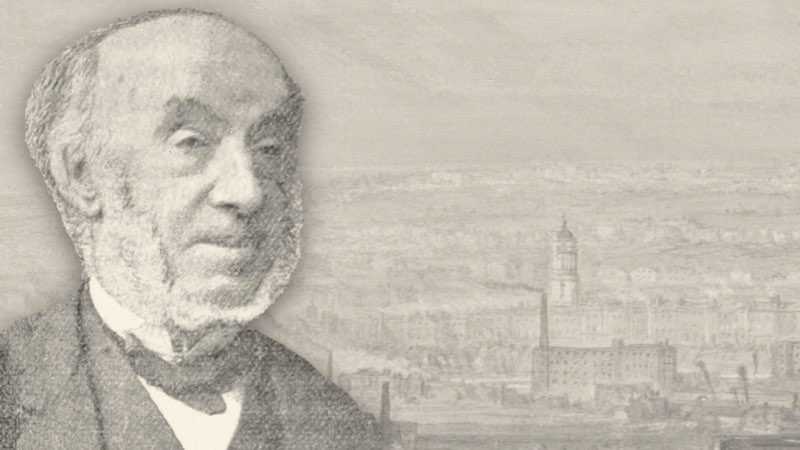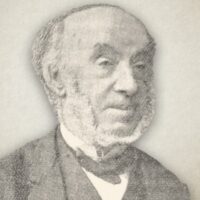
The Life And Ministry Of Charles Gordelier
Earthen Vessel 1892:
The Late Charles Gordelier, Baptist Minister
My father, the late Charles Gordelier, was born on the 14th April, 1813, in Norton Folgate, Bishopsgate. His father was a deacon of the French Protestant Church in Spitalfields. My father left school at the age of twelve years, his education therefore was very limited. In the year 1828, my grandfather took part of a house with Mr. John Bowers, whose daughter Elizabeth he afterwards married, on the 24th April, 1834. Two daughters by his first marriage are still living; the eldest has been house-keeper for twenty years, at 48, Market-place, Leicester (the late Mr. John Orton’s), and the second is married to Captain J. W. Gifford, and resides in Rhodes Island, United States. My father’s first wife died very suddenly while singing a hymn, in Hepzibah Chapel, Mile End, on August 13th, 1848. The following year my father married Elizabeth, eldest daughter of Mr. Thomas Harris, of Barking, Essex, by whom he had two children, a son, who died in infancy, and myself. My mother died September 25th, 1881, after a long and severe illness, borne with great patience. My father’s first lecture in public was given at Queen-street Institute, November 25th, 1846, since that date he has spoken in 257 places, preached in 33 counties, travelled more than 120,000 miles, and visited 335 towns and villages. The last preaching engagement he was able to keep was at Banbury, July 10th, 1892. He preached from Hebrews 7:22, in the morning, and in the evening from Hebrews 7:25. He was so feeble that the friends kindly sent him in a bath-chair to the chapel. I took him to Paddington on the Saturday previous, and had great difficulty in getting him there, he was not fit to travel, and I felt convinced it was his last journey, and so it proved, he never left the house again after his return on the following Monday. On July 13th, I sent for his medical man, who, after a careful examination, could find no trace of any disease, only extreme exhaustion of brain and body. For the last nine months my father had been losing flesh, and was unable to enjoy food, complaining that everything had a bitter taste, and this increased every week. He told me, some weeks before he died, that he felt he was fading away, and that July would be his fatal month. Through the kindness of friends I was able to provide him with everything that was nourishing, but nothing tempted him, and at the sight of food, he would frequently burst out crying because he could not enjoy it, or swallow it easily. Until within a week of his death, he was able to be up and attend to a little business, and, on the Thursday before his death, he wrote four letters, cancelling his preaching engagements. On Monday, July 25th, he refused everything I took him, so, by advice of the doctor, I sent to the “Nursing Sisters’ Institution” for a nurse (the lady Superintendent having previously promised to send me one if required), and in the evening Sister Back came, and from that time my father was never left, and carefully and tenderly nursed by a most kind and sympathetic nurse, of whom I cannot speak too highly. On Tuesday an old and esteemed friend of my father’s came from Saffron Walden, and was able to be with him for a few minutes, and on Wednesday my sister came from Leicester. In the evening of Wednesday, hemorrhage of the bowels came on, and he sank rapidly, but he retained consciousness to the last, and just before he died he said, ”Good-bye” three times to my sister, nurse, and myself; he then added, “God in His wisdom will guide you.” I do not think he spoke again distinctly, and at 8 p.m. on Thursday be passed away. A few days before he died he told a friend he did not wish to see anyone, he had done with the world, and this will explain why no one saw him but his own family. He was interred in his family grave in Bow Cemetery by his own desire. Mr. John Waters Banks had the funeral arrangements, and everything was carried out in a most satisfactory manner. The funeral took place on August 1st. My sister, Mrs. Jacob, Messrs. Jacob, Sanders, Starkey, and Tucker, followed his remains to the grave, and at the close of the Church service a short prayer was offered, and a hymn sung. My father left orders for the memorial cards, and I only had the date to fill in; everything else was left in as orderly manner as it was possible to do it. In conclusion, may I take this opportunity of thanking all the kind friends who have written to me, and to say it is impossible for me to reply to each personally, but I do feel grateful to them for all their past kindness to my father, and since his death to myself.
“Now the labourer’s task is o’er,
Now the battle day is past,
Now upon the farther shore
Lands the voyager at last.”
“There the tears of earth are dried,
There its hidden things are clear,
There the work of life is tried,
By a juster Judge than here.
Father, in Thy gracious keeping
Leave we now Thy servant sleeping.”
M. H. Gordelier
The Funeral
Our old and highly-esteemed friend and brother, Charles Gordelier, was buried in the family grave at Bow Cemetery, on Monday, Aug. 1st, 1892. Mr. Starkey, Mr. Ebenezer Jacob, Mr. Sanders, and a few other friends followed. The grave being in what is called “consecrated ground,” the Episcopalian Chaplain read the usual formula, at the conclusion of which an impromptu service was conducted. Mr. Starkey, in a brief address spoke of the deceased as a Christian, a minister of the Gospel, a brother beloved, a sinner saved by grace, and one who had left all earthly toil and trial for the mansions of heavenly rest and peace, and concluded in announcing a verse, which the little company of true and earnest friend’s surrounding the grave united in singing. Mr. Jacob, after a brief word or two, gave out one verse of Montgomery’s sweet hymn, “For ever with the Lord.” Mr. Sanders laid the circumstances before the Lord at the throne of grace. Mr. Jacob then gave out a verse or two of David Denham’s hymn (996), entitled, “The Happy Exit,” founded on Paul’s words in 2 Cor. 5:8, “Our brother has gained his release,” which we sang as well as we could: and after a few words in prayer by J. W. Banks, we each took a last glance into the grave on the coffin, and bid farewell, till the resurrection morn, to Charles Gordelier, who, in season and out of season, was a firm, staunch, unwavering preacher of the Gospel of the grace of God for over 40 years. His name and memory will long be revered by many hundreds, but by none more so than—
J. W. Banks
As we gave, in our September Number, an account of the late Charles Gordelier, a brief notice is all that is necessary in connection with the portrait now given. Whatever we may say of our departed friend to whom we were strongly attached by the ties of brotherly love, is not for the sake of eulogising the creature, but for the glory of God. It was a somewhat familiar saying with our brother—“By the grace of God I am what I am,” and, it is almost needless to add, he fully understood the meaning of those blessed words. Grace made him a Christian, grace made him a lover of the doctrines of the Bible, grace made him obedient to the commandments of the Word and the ordinances of God’s house, grace made him a faithful and decided minister of the Gospel, and grace gave him a loving and sympathising heart.
In his ministry he came down into the hearts of the sorely tried and deeply-exercised believer; he never (to use his own expression) got farther in the divine life than “Hope;” hence his ministry was much blessed, and most useful to those of little faith. During the latter part of his life, he felt the great importance and responsibility of his ministerial office, and was frequently, while preaching, so favoured with the presence of Christ in his soul, that tears would flow down his face, and his lips tremble with sweet and sacred emotion. Having said thus much, our readers who were not favoured with his acquaintance, will rightly comprehend how fully he understood the meaning of the words—“By the grace of God I am what I am.”
Charles Gordelier was one of the first and earliest of my late father’s ministerial friends in London, and remained to the last a staunch, undeviating friend, in season and out of season; in times of deepest trial he was a true helpful friend, and a good and wise counsellor; and when my father was nearing the end of his journey, he asked his brother Gordelier, of over forty-years’ deepest friendship and fellowship, to say a few words at his funeral. Knowing so much of our departed brother’s real worth, our readers will better understand the two closing lines I wrote, and which appear on page 286 of the September number of this year.
John W. Banks
Charles Gordelier (1813-1892) was a Strict and Particular Baptist preacher. Throughout the course of his gospel labour, he spoke in 257 places, preached in 33 counties, travelled more than 120,000 miles and visited 335 towns and villages.



